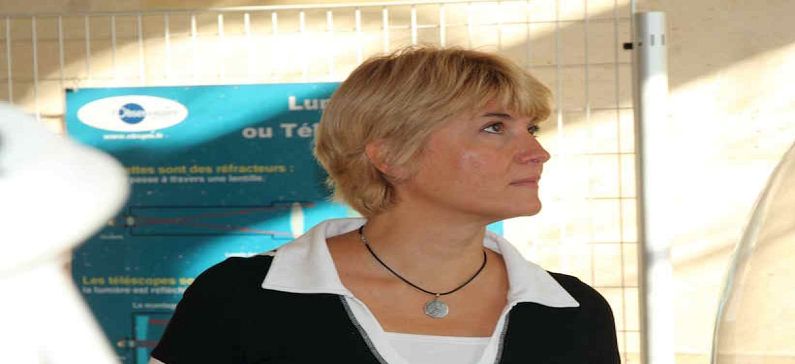
You were born in Greece. Where exactly?
I was born in Athens. However, my origins are in the Peloponnese and specifically in Arcadia.
What’s your strongest childhood memory?
I spent my childhood years in Greece, at the district of Faliro, where in the old days and still today we are recreating the Universe near the sea together with my friends Fotini, Eleni, Demi and other friends, by staring at the stars.
Your research focus is something you have been dreaming of doing since you were young? When and how did you realize that stars would be the subject of your future job?
As it is usual among the astronomers, my interest was born by an extended and rampant imagination that found its way out and was fed with science fiction in literature and cinema, like Star Trek and Asimov etc. So, since the age of 15, I wanted to be into planets and understand what they are made of and how we can explore them better. By staring at the stars and the planets through the clear sky of Greece, I wanted to see them and study them closely, a dream I accomplished later on.
You are the Director of Research 1st class with the National Centre for Scientific Research (CNRS) of France and with the Paris Observatory in Meudon. You also participate in space missions of ESA and NASA. What exactly are your duties?
I am the President of the International Association of Meteorology and Atmospheric Sciences, the President of the Commission for Planetary Sciences of the European Institute of Science and a life member of the Air Academy of Greece. Moreover, I am member of the American Astronomical Society (specifically Secretary General of the Division for Planetary Sciences), Executive Director of the Asia Oceania Geosciences Society, the French Astronomical Association, the International Astronomical Union and the American Geophysical Union. I participate in the advisory groups of the two space agencies of ESA and NASA, specifically as member of the Advisory Group for Space Science and also as member of ESA’s Exploration Science and Technology Advisory Group. Through these positions, I fully participate in the decision-making process regarding international policies for space missions and for the study of our solar system and other astronomical objects. As a director of research, I have formed a research team, with two Greek participants, who earned their PhD under my supervision, George Babasidis, who after his successful and complete studies on Space Physics, currently holds a Professor position in Greece and Anezina Solomonidou, who by continuing her research on planetary geology is currently a post doctorate researcher at the Jet Propulsion Laboratory of NASA in California. I wish that these two fellows pursue a career in astrophysics by fully participating in the research proceedings in Greece, as they are two hardworking scientists and we need them.
I have read that your research focuses on planetary atmospheres and surfaces, with a stress on frozen moons, like Titan and Enceladus, Saturn’s satellites. Actually, you have received several awards thanks to this research. Please, share some details with us.
Titan and Enceladus are two remarkably living worlds, two different satellites that have a lot to teach us about the creation of our planetary system on the scientific level on one hand and on the other on more applied issues for the primeval atmosphere of Earth and the possibility of life existence beyond Earth. Titan, half the size of Earth, is a reference point in the solar system thanks to its dense nitrogenous atmosphere, rich in organic complexes, and also thanks to it mysteriously diverse surface. So, in the case of Titan and on universe level, we observe a unique planetary environment, apart from the earthly environment, that shows signs of a dense atmosphere, organic chemistry and lakes. Titan has a lot of similarities with Earth, like the nitrogen atmosphere as mentioned above, where we observe methane traversing a circle similar to the circle of the water on Earth, following the stages of evaporation and concentrate in a type of rain that falls quite slowly (because Titan’s gravity corresponds to 1/7 of Earth’s gravity) forming a type of rivers and lakes that are either frozen or liquid. Unfortunately, frozen water on Titan’s surface is solid like rocks on Earth due to the planet’s low temperature (-180 °C). The presence of methane and other hydrocarbons impacts directly on the geology and geomorphology of the satellite, expressed mainly though the huge lakes next to polar areas, the development of emanation networks and the presence of extended dunes and mountain ranges in equatorial amplitude. The presence of an inner water ocean under the surface ice is possible. These similarities in the geomorphology of the planets, like the existence of mountains, fault lines, emanation networks, dunes etc. constitute Titan as a dynamic geological environment similar to the environment of the Earth that is overwhelmed by internal and external elaborations. The connection of Titan’s data that we analyze as far as the interacting interior, surface and atmosphere are concerned, will produce the solution to several mysteries about the environment evolution compared to the atmospheric structure of primeval Earth. Conclusively, the study of the atmospheric structure of Titan, given its similarities to the earthly atmospheric structure, contributes to the international research on climate change and on the impacts of the Greenhouse Effect on our planet, two of the most crucial political and social issues that currently trouble humanity. So, if we wish to talk about a secondary Earth, we focus our attention and research interest on Titan and we learn a lot, specifically about the creation of life.
Enceladus is the second important focus of scientists regarding the moons of Saturn. Though small in size, with radius of 252 km, frozen Enceladus is surprisingly active. According to the discoveries of the spaceship Cassini, Enceladus has volcanos, although it’s frozen. The rapidly erupted ice fountains from Enceladus form the Ring E of Saturn. It still remains a mystery how water remains in liquid form regardless of being so far away from our Sun.
It is obvious that whoever studies Saturn’s satellites, he will discover new data on a daily basis. For that reason, we propose new space missions that will study them thoroughly.
What concerns me and interests me more is that we will need scientific workforce to assist us during the following decades that we will be analyzing Cassini’s data and preparing a bold return to Titan and Enceladus, with an airship and a spaceship that will land on some lake of Titan. That’s our current work with Giorgos Babasidis and Anezina Solomonidou, that despite all the adversities of the Greek system, they try with their research to add a page in the study of Titan and Enceladus. The presence of Greek youth is very significant for the plans of the future space exploration of our solar system.
Your career looks impressive. It is hard to stand out in your profession, isn’t it?
It’s never easy. The first difficulty I faced was trying to convince my parents to allow me to relocate to France to study. Later, I had to graduate from university with poor French and also gain my PhD. Moreover, as a woman I had to work harder than my male colleagues as it is used. However, I soon got a scholarship and had the opportunity to enjoy respect and fulfillment within the community. Then I worked hard, with passion and curiosity for my job and I was offered a permanent position at the National Centre for Scientific Research (CNRS) in France. Step by step, I was gradually established in the international community following cooperation and dynamic presence in research. Anything can be accomplished with hard work and persistence.
Currently you live in Paris. How hard was it to leave Greece behind? Is a future return in your agenda and under what circumstances?
It is always hard at the beginning, particularly for a young girl at the age of 18, my age when I relocated to France.
Going back? Why not? Possibly after retirement.
I worked hard to establish my status and my professional identity in France and internationally. If I believed that I would have the opportunity to get the same results in my area and gain the same significance in Greece, I would possibly return whatever means I would have in my possession. However, not permanently. I’m a child of the universe and a citizen of the world and I like to have several bases around the world.
Do you believe that Greece has the potential to do business in astrophysics and possibly in space services? Recently, Periklis Papadopoulos of NASA talked about a space station in Kalamata. Do you find it possible?
In Greece, significant efforts are underway in the area of space science even with the support of the poor means offered by the state for the specific science and for the areas of exact sciences in general. Except from our own team of collaborators at the Physics Department of the Kapodistrian University of Athens, Dr. Stamatis Krimizis and his team at the Academy of Athens present longstanding and important work in the area of planetary research. As for the proposition of Periklis on the space portal in Kalamata, I find it a viable idea and I think that it is a fantastic opportunity for extra jobs in Kalamata or any other Greek city. A space portal presents an attraction in the industry of space tourism that is rapidly growing internationally. Allow me to underline that the implementation of a similar idea requires solemnity, responsibility and dedication. I wish that the state mechanism will work well throughout the procedure.
What’s your future agenda?
In the area of research, I would like to continue observing and analyzing the satellites of Jupiter and Saturn. The Cassini/Huygens mission has already raised a multitude of questions. Unfortunately, the current data is not enough to provide us with answers. Within this frame, an important number of future missions are already underway, in new spaceships equipped with a lot of scientific instruments for the thorough study of Titan and Enceladus. One of the current proposals concerns Titan, equipped with an airship that will travel for about a year following a flying schedule of low trajectory that is close to the surface, from a vehicle that will land on one of the large hydrocarbon lakes of Titan. The proposal for an airship mission to Titan has largely attracted the interest and enthusiasm of the academic community and the public and would offer us crucial technological and planetary discoveries. Moreover, some other planetary bodies that attract our interest and I tend to focus my research on them are the exoplanets, meaning planets that are located outside our solar system and do not move around our Sun. Analyzing them is crucially important, as their existence sets new basis for the issue of life existence in the universe. Finally, in the technical part of my job and thanks to my participation in several committees and organizations in various countries, I will continue being into advising and organizational policy of space, an area where I wish Greece will be present some day soon.
Do you visit Greece often? What destinations do you prefer?
I visit Greece together with my family, my daughter Kallista and my husband Frank, once or twice a year. Kallista loves Greece and she speaks fluent Greek. Our first stop is the district of Faliro and then we travel to the Peloponnese or Arcadia or the islands. We prefer Evia, Santorini, Kasos and Crete. In the near future we plan to discover some other islands, like Milos that we were given the best recommendations.
What does Greece mean to you?
Greece is my homeland, I will always be Greek. Greece is a country with vast possibilities for development and promotion of its culture, but it is unfortunately content with its history and personal ambition that has devoured it.
What is your top question to Greeks, supposing you had the opportunity to get their answer?
How many of you are still making dreams? I would advise them, especially young people, to never stop dreaming.
Director of Research in the National Centre for Scientific Research of France
Athena Coustenis is Director of Research 1st class with the National Centre for Scientific Research (CNRS) of France, working at Paris Observatory in Meudon, Paris. She collaborates with the European Space Agency (ESA) as also with NASA (National Aeronautics and Space Administration). Coustenis specialty is Planetology. Her research is devoted to the investigation of planetary atmospheres and surfaces, with emphasis on icy moons like Titan and Enceladus, Saturn’s satellites.
She was born on September 28th 1961, in Athens, Greece. In 1980 she began studying both Physics and English Literature in Paris. She earned a Master Degree in Astrophysics and Space techniques and a second Master Degree in English Literature and in 1989 she earned a PhD in Astrophysics and Space techniques from University 7 in Paris. Later, she completed a Post-Doc at Paris Observatory.
The Greek scientist participated in European Space Agency’s (ESA) and National Aeronautics and Space Administration’s (NASA) space missions and was heavily involved in the Cassini-Huygens mission as well as into the preparation of future space missions to Jupiter and Saturn planets.
She has been awarded many times by both NASA and ESA. In 1996, she was awarded with the Diploma of Management Research in Astrophysics and Space Technology by the University 7 of Paris, which is the highest academic eminence in France. In 2012, she got the award of «Prix pour la réussite au Feminin»
The American Astronomical society announced that Athena Coustenis will be honoured with the award “Harold Masursky” for her outstanding service to planetary science and exploration. According to the American Astronomical Society, Athena Coustenis has an impressive scientific research career and has made major contributions to planetary science in the spirit of the Harold Masursky award. The prize will be awarded to her in November 2014, in Arizona, USA.
She is President of the International Association of Meteorology and Atmospheric Sciences and of the Planetary Sciences Division of the European Geosciences union and a life member of the Air Academy of Greece. She is also member of the American Astronomical society, she is executive director of Asia Oceania Geosciences Society, French Astronomical union, International Astronomical union and American Geophysical union.
Athena Coustenis is married to Franck Darin and has a daughter, Callista.
Read below Athena Coustenis” interview at Ellines.com Team
INTERVIEW...
You were born in Greece. Where exactly?
I was born in Athens. However, my origins are in the Peloponnese and specifically in Arcadia.
What’s your strongest childhood memory?
I spent my childhood years in Greece, at the district of Faliro, where in the old days and still today we are recreating the Universe near the sea together with my friends Fotini, Eleni, Demi and other friends, by staring at the stars.
Your research focus is something you have been dreaming of doing since you were young? When and how did you realize that stars would be the subject of your future job?
As it is usual among the astronomers, my interest was born by an extended and rampant imagination that found its way out and was fed with science fiction in literature and cinema, like Star Trek and Asimov etc. So, since the age of 15, I wanted to be into planets and understand what they are made of and how we can explore them better. By staring at the stars and the planets through the clear sky of Greece, I wanted to see them and study them closely, a dream I accomplished later on.
You are the Director of Research 1st class with the National Centre for Scientific Research (CNRS) of France and with the Paris Observatory in Meudon. You also participate in space missions of ESA and NASA. What exactly are your duties?
I am the President of the International Association of Meteorology and Atmospheric Sciences, the President of the Commission for Planetary Sciences of the European Institute of Science and a life member of the Air Academy of Greece. Moreover, I am member of the American Astronomical Society (specifically Secretary General of the Division for Planetary Sciences), Executive Director of the Asia Oceania Geosciences Society, the French Astronomical Association, the International Astronomical Union and the American Geophysical Union. I participate in the advisory groups of the two space agencies of ESA and NASA, specifically as member of the Advisory Group for Space Science and also as member of ESA’s Exploration Science and Technology Advisory Group. Through these positions, I fully participate in the decision-making process regarding international policies for space missions and for the study of our solar system and other astronomical objects. As a director of research, I have formed a research team, with two Greek participants, who earned their PhD under my supervision, George Babasidis, who after his successful and complete studies on Space Physics, currently holds a Professor position in Greece and Anezina Solomonidou, who by continuing her research on planetary geology is currently a post doctorate researcher at the Jet Propulsion Laboratory of NASA in California. I wish that these two fellows pursue a career in astrophysics by fully participating in the research proceedings in Greece, as they are two hardworking scientists and we need them.
I have read that your research focuses on planetary atmospheres and surfaces, with a stress on frozen moons, like Titan and Enceladus, Saturn’s satellites. Actually, you have received several awards thanks to this research. Please, share some details with us.
Titan and Enceladus are two remarkably living worlds, two different satellites that have a lot to teach us about the creation of our planetary system on the scientific level on one hand and on the other on more applied issues for the primeval atmosphere of Earth and the possibility of life existence beyond Earth. Titan, half the size of Earth, is a reference point in the solar system thanks to its dense nitrogenous atmosphere, rich in organic complexes, and also thanks to it mysteriously diverse surface. So, in the case of Titan and on universe level, we observe a unique planetary environment, apart from the earthly environment, that shows signs of a dense atmosphere, organic chemistry and lakes. Titan has a lot of similarities with Earth, like the nitrogen atmosphere as mentioned above, where we observe methane traversing a circle similar to the circle of the water on Earth, following the stages of evaporation and concentrate in a type of rain that falls quite slowly (because Titan’s gravity corresponds to 1/7 of Earth’s gravity) forming a type of rivers and lakes that are either frozen or liquid. Unfortunately, frozen water on Titan’s surface is solid like rocks on Earth due to the planet’s low temperature (-180 °C). The presence of methane and other hydrocarbons impacts directly on the geology and geomorphology of the satellite, expressed mainly though the huge lakes next to polar areas, the development of emanation networks and the presence of extended dunes and mountain ranges in equatorial amplitude. The presence of an inner water ocean under the surface ice is possible. These similarities in the geomorphology of the planets, like the existence of mountains, fault lines, emanation networks, dunes etc. constitute Titan as a dynamic geological environment similar to the environment of the Earth that is overwhelmed by internal and external elaborations. The connection of Titan’s data that we analyze as far as the interacting interior, surface and atmosphere are concerned, will produce the solution to several mysteries about the environment evolution compared to the atmospheric structure of primeval Earth. Conclusively, the study of the atmospheric structure of Titan, given its similarities to the earthly atmospheric structure, contributes to the international research on climate change and on the impacts of the Greenhouse Effect on our planet, two of the most crucial political and social issues that currently trouble humanity. So, if we wish to talk about a secondary Earth, we focus our attention and research interest on Titan and we learn a lot, specifically about the creation of life.
Enceladus is the second important focus of scientists regarding the moons of Saturn. Though small in size, with radius of 252 km, frozen Enceladus is surprisingly active. According to the discoveries of the spaceship Cassini, Enceladus has volcanos, although it’s frozen. The rapidly erupted ice fountains from Enceladus form the Ring E of Saturn. It still remains a mystery how water remains in liquid form regardless of being so far away from our Sun.
It is obvious that whoever studies Saturn’s satellites, he will discover new data on a daily basis. For that reason, we propose new space missions that will study them thoroughly.
What concerns me and interests me more is that we will need scientific workforce to assist us during the following decades that we will be analyzing Cassini’s data and preparing a bold return to Titan and Enceladus, with an airship and a spaceship that will land on some lake of Titan. That’s our current work with Giorgos Babasidis and Anezina Solomonidou, that despite all the adversities of the Greek system, they try with their research to add a page in the study of Titan and Enceladus. The presence of Greek youth is very significant for the plans of the future space exploration of our solar system.
Your career looks impressive. It is hard to stand out in your profession, isn’t it?
It’s never easy. The first difficulty I faced was trying to convince my parents to allow me to relocate to France to study. Later, I had to graduate from university with poor French and also gain my PhD. Moreover, as a woman I had to work harder than my male colleagues as it is used. However, I soon got a scholarship and had the opportunity to enjoy respect and fulfillment within the community. Then I worked hard, with passion and curiosity for my job and I was offered a permanent position at the National Centre for Scientific Research (CNRS) in France. Step by step, I was gradually established in the international community following cooperation and dynamic presence in research. Anything can be accomplished with hard work and persistence.
Currently you live in Paris. How hard was it to leave Greece behind? Is a future return in your agenda and under what circumstances?
It is always hard at the beginning, particularly for a young girl at the age of 18, my age when I relocated to France.
Going back? Why not? Possibly after retirement.
I worked hard to establish my status and my professional identity in France and internationally. If I believed that I would have the opportunity to get the same results in my area and gain the same significance in Greece, I would possibly return whatever means I would have in my possession. However, not permanently. I’m a child of the universe and a citizen of the world and I like to have several bases around the world.
Do you believe that Greece has the potential to do business in astrophysics and possibly in space services? Recently, Periklis Papadopoulos of NASA talked about a space station in Kalamata. Do you find it possible?
In Greece, significant efforts are underway in the area of space science even with the support of the poor means offered by the state for the specific science and for the areas of exact sciences in general. Except from our own team of collaborators at the Physics Department of the Kapodistrian University of Athens, Dr. Stamatis Krimizis and his team at the Academy of Athens present longstanding and important work in the area of planetary research. As for the proposition of Periklis on the space portal in Kalamata, I find it a viable idea and I think that it is a fantastic opportunity for extra jobs in Kalamata or any other Greek city. A space portal presents an attraction in the industry of space tourism that is rapidly growing internationally. Allow me to underline that the implementation of a similar idea requires solemnity, responsibility and dedication. I wish that the state mechanism will work well throughout the procedure.
What’s your future agenda?
In the area of research, I would like to continue observing and analyzing the satellites of Jupiter and Saturn. The Cassini/Huygens mission has already raised a multitude of questions. Unfortunately, the current data is not enough to provide us with answers. Within this frame, an important number of future missions are already underway, in new spaceships equipped with a lot of scientific instruments for the thorough study of Titan and Enceladus. One of the current proposals concerns Titan, equipped with an airship that will travel for about a year following a flying schedule of low trajectory that is close to the surface, from a vehicle that will land on one of the large hydrocarbon lakes of Titan. The proposal for an airship mission to Titan has largely attracted the interest and enthusiasm of the academic community and the public and would offer us crucial technological and planetary discoveries. Moreover, some other planetary bodies that attract our interest and I tend to focus my research on them are the exoplanets, meaning planets that are located outside our solar system and do not move around our Sun. Analyzing them is crucially important, as their existence sets new basis for the issue of life existence in the universe. Finally, in the technical part of my job and thanks to my participation in several committees and organizations in various countries, I will continue being into advising and organizational policy of space, an area where I wish Greece will be present some day soon.
Do you visit Greece often? What destinations do you prefer?
I visit Greece together with my family, my daughter Kallista and my husband Frank, once or twice a year. Kallista loves Greece and she speaks fluent Greek. Our first stop is the district of Faliro and then we travel to the Peloponnese or Arcadia or the islands. We prefer Evia, Santorini, Kasos and Crete. In the near future we plan to discover some other islands, like Milos that we were given the best recommendations.
What does Greece mean to you?
Greece is my homeland, I will always be Greek. Greece is a country with vast possibilities for development and promotion of its culture, but it is unfortunately content with its history and personal ambition that has devoured it.
What is your top question to Greeks, supposing you had the opportunity to get their answer?
How many of you are still making dreams? I would advise them, especially young people, to never stop dreaming.






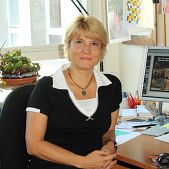
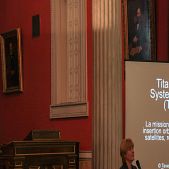
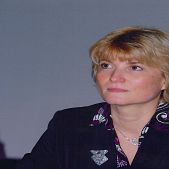
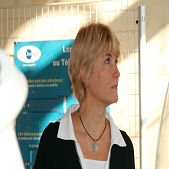
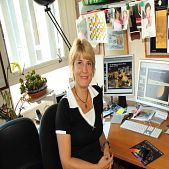
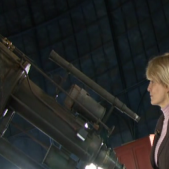







Λαζαριδης Μανωλης
-29/11/2015 10:17 pm
Συγχαρητηρια
Stavros Konstantinidis
-06/06/2021 7:00 am
Αναζήτηση ψυχής 🌌
Το Μέλλον προέρχεται από την αναζήτηση του παρελθόντος προς το Μέλλον 🌌🎓📐📏
Ευγνώμων για το έργο σας 🙏🌌🎓📐📏